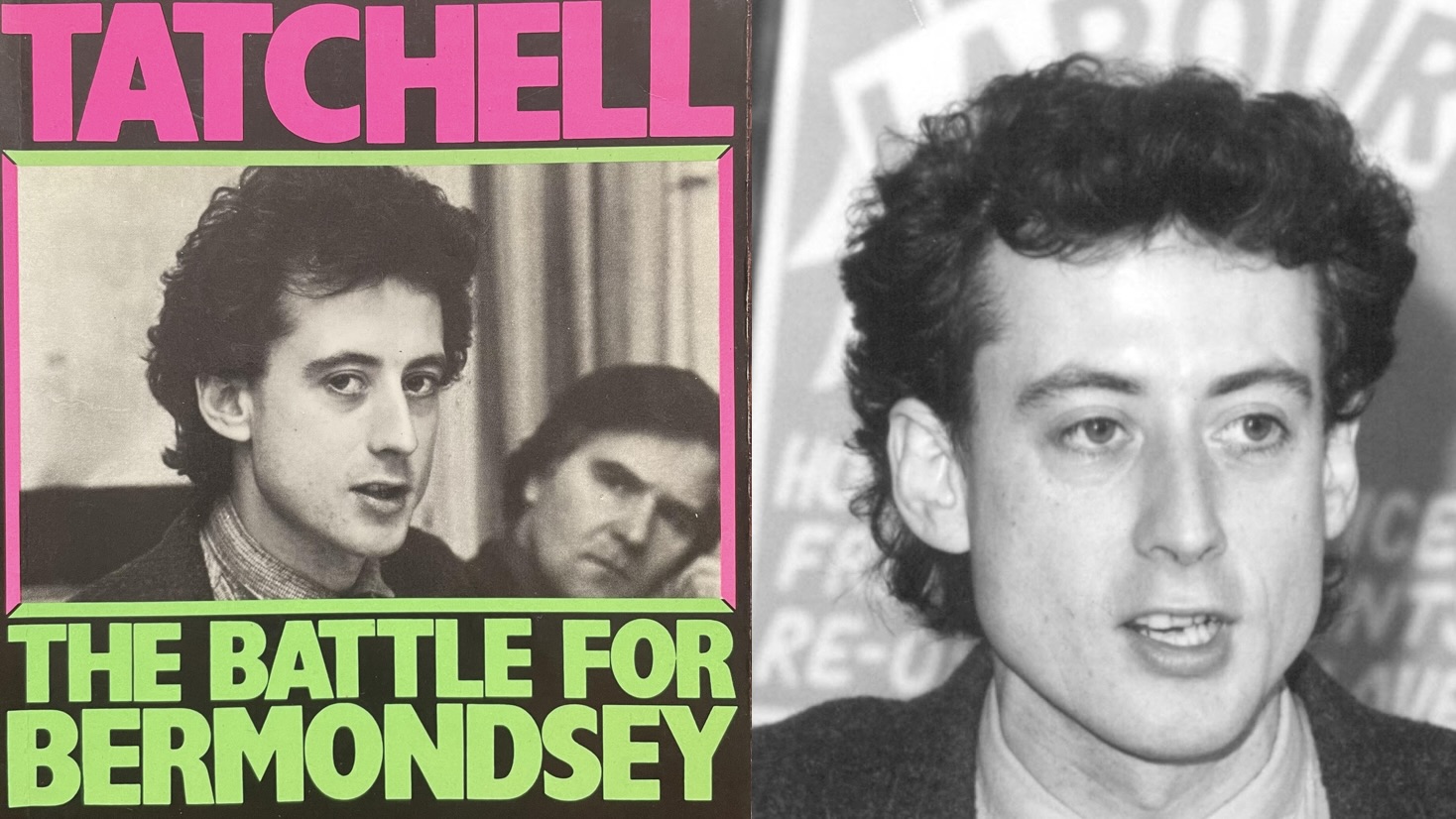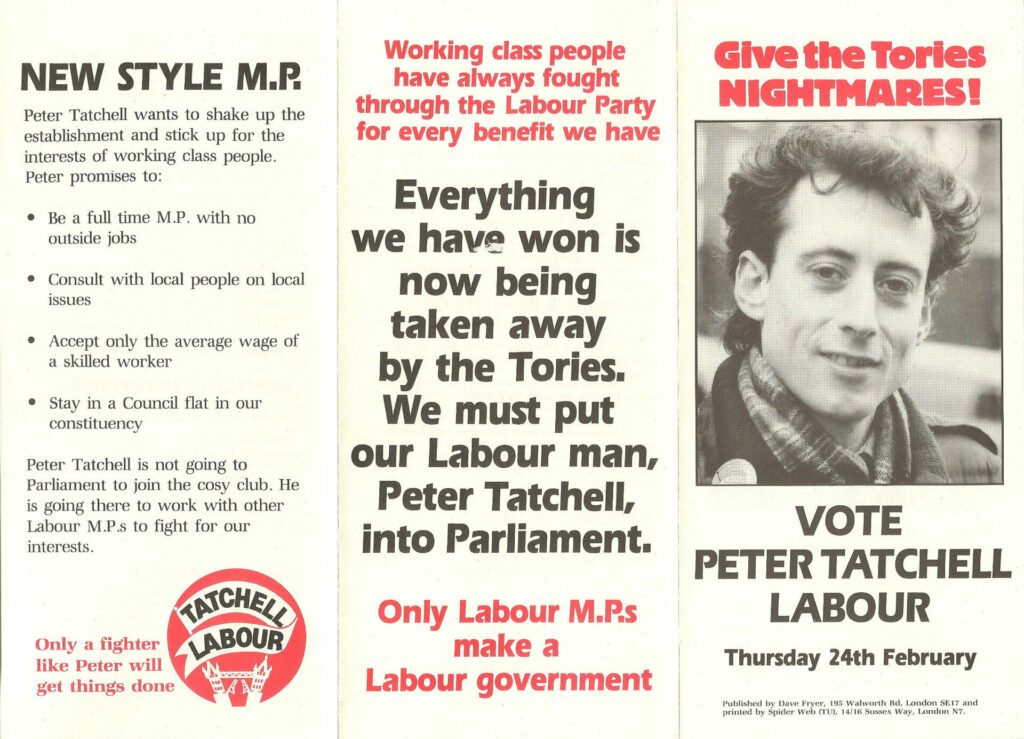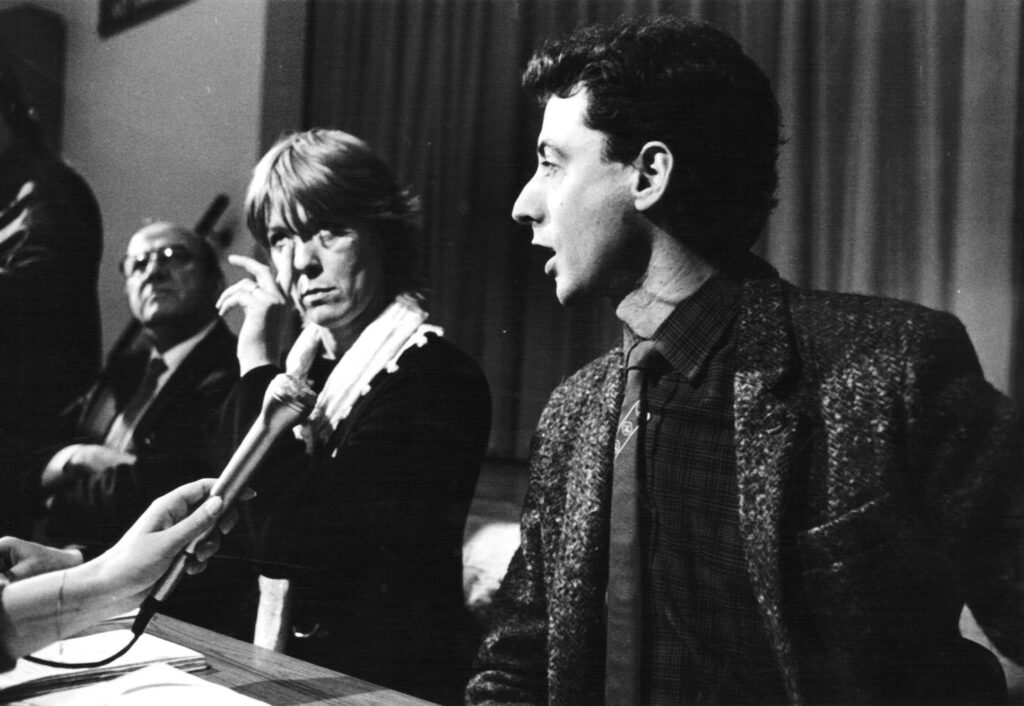Peter Tatchell on the 1983 Bermondsey by-election: ‘My baptism of fire’
Ahead of the Bermondsey by-election's 40th anniversary, Peter Tatchell remembers "the most dirty, violent and homophobic election in British history."

The worst vilification of a gay public figure since Oscar Wilde. That’s how some commentators described what happened to me in the notorious Bermondsey by-election in south London on 24 February 1983 – 40 years ago.
I was 31 years old and the gay Labour candidate for MP. It was the most dirty, violent and homophobic election in British history.
Bermondsey was my baptism of fire. It was hell. Looking back, I don’t know how I got through it. Much of the time, I feared being murdered.
My campaign against property developers taking over the area and squeezing out local working class people resulted in me being smeared as a “communist”. People told me: “Go back to Russia.”

Advocating for LGBT+ rights was something parliamentary candidates from the major parties never did in the early 1980s. In those days, the voters were so homophobic.
So when I proposed the repeal of all anti-gay laws, it provoked uproar. I was condemned as “unfit to be an MP.”
The tabloid papers waged a constant tirade of lies and smears to discredit me and prevent my election. They printed fabricated claims that I had deserted my would-be constituents to go to the ‘Gay Olympics’ in San Francisco. My support for LGBT+ rights was rubbished and ridiculed.
Some papers published photos that made it look like I had plucked eyebrows and was wearing mascara and lipstick. My complaints to the regulator, the Press Council, were ignored. I felt totally powerless.
“I was punched, kicked, and battered with sticks, leaving me with bruises, abrasions, and chipped teeth”
Non-stop demonisation by the press fuelled a hate campaign against me. I was subjected to more than 100 violent assaults, including two attempts by drivers to run me down. One side-swiped me when I was cycling, knocking me into the gutter. He sped off shouting: “Tatchell, you communist poof!”
While canvassing, I was punched, kicked, and battered with sticks, leaving me with bruises, abrasions, and chipped teeth. Dogs were set on me. I was spat at. The assaults were accompanied by homophobic abuse: “You filthy queer!” and “Get lost you f***ing bender.”
There were also 30 attacks on my flat – including arson, bricks, bottles, and a bullet through the letterbox. 30 death threats, hundreds of hate letters, and late-night threatening phone calls terrorised me. It felt like living in a war zone. I suffered from PTSD and night terrors.
Supporters of rival candidates charged around the constituency chanting: “Tatchell is an Aussie. Tatchell is a poof. Let’s all go down the Rockingham (where I lived) and throw him off the roof.”
“Despite being in serious danger, the police refused me protection.”
On almost every wall and railway arch, they painted in giant three-feet-high letters: “Tatchell is queer.”
The retiring Labour MP for Bermondsey, Bob Mellish, supported the vicious homophobic campaign against me, despite his own secret bisexuality and his attempts, two years earlier, to seduce me. He backed a rival “Real Labour” candidate, John O’Grady, who toured around Bermondsey singing an anti-gay ditty: “Tatchell is a poppet, as pretty as can be…He wears his trousers back to front because don’t know this from that.”
One night, an illegal leaflet was distributed across the constituency. Headlined “Which Queen will you vote for?” it featured pictures of the Queen and me. It looked like I was wearing make-up. It listed my home address and phone number and invited voters to give me a piece of their minds. Some responded with violent attacks on my home.
Despite being in serious danger, the police refused me protection. I had to fend for myself. I slept with a fire extinguisher and a rope ladder, to abseil down the back of my block of flats if extremists bashed down my front door and tried to kill me.

During this time, I was struggling to maintain my relationship with star footballer Justin Fashanu of Nottingham Forest. The paparazzi hounded us both for different reasons. Our romance had to be secret because he was not out back then.
Being known to be gay would have destroyed his football career. The covertness strained our relationship but we pulled through. Justin’s affection helped sustain me. And I, in turn, supported him as he battled homophobic jibes from his manager at Nottingham Forest, Brian Clough, who suspected Justin was gay.
On election day, I lost to Simon Hughes of the Liberals in the biggest swing in UK electoral history. The Liberals waged a dirty homophobic campaign. Canvassers wore lapel stickers reading “I’ve been kissed by Peter Tatchell”. On the doorsteps, they told voters: “We don’t mind that Peter Tatchell is gay.” Both these tactics sought to remind electors of my homosexuality, in a subtle appeal to homophobic voters.
The Liberals resorted to these sly anti-gay methods despite Simon Hughes being bisexual; though he never came out until two decades later, long after he’d won an election rooted in homophobia that he never condemned at the time.
“Bermondsey was a loss for me but a win, win, win for others”
Despite all these horrors, the Bermondsey by-election had positive outcomes. First, my advocacy put LGBT+ rights on the mainstream political agenda for the first time ever. Second, after the election was over, many journalists and much of the public felt embarrassed and ashamed by the homophobic campaign against me.
Their guilt meant that subsequent gay candidates and MPs had a much easier ride. And third, for the same reasons, political parties became wary of exploiting homophobia during elections.
Bermondsey was a loss for me but a win, win, win for others. Bravo!
The Bermondsey by-election features in the documentary Hating Peter Tatchell, available on Netflix.
